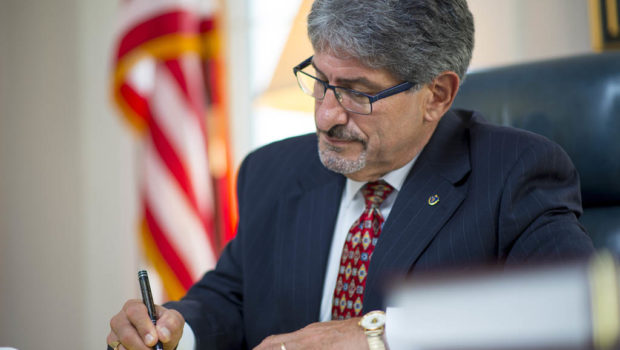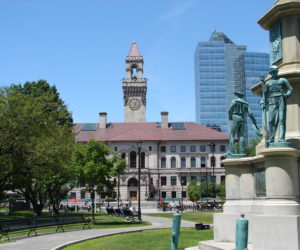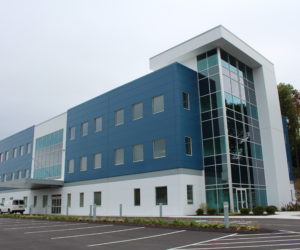Reacting to a vote by the Fitchburg City Council Dec. 3, the city’s mayor, Stephen DiNatale, declared: “Now, we’re competitive.”
The vote, which was resoundingly successful at 8-2, immediately switched the city’s then separate commercial and residential tax rates to a single rate – a feat the Worcester Regional Chamber of Commerce has advocated for in the Heart of the Commonwealth for decades.
As of Jan. 1, Fitchburg joins neighboring Leominster and Lunenburg in setting a single rate for all taxpayers, a practice now employed by 67.5 percent of 351 Massachusetts cities and towns, according to state figures.
The fiscal year 2020 single rate of $19.71 per $1,000 of assessed valuation established by the Fitchburg Council for residential as well as commercial/industrial/ personal accounts, compared to the previous year’s rates of $20.49 for residential properties and $22.09 for the remaining categories, represents a compromise for both categories of taxpayer.
“We are now in the bottom 20 percent of single-home tax [rates],” said Mr. DiNatale. “There will be 36 percent less impact on residential [taxpayers] this year [and] we will retain and grow our [tax] base. Fitchburg Councilor-at-Large Samantha Squailia explained rate shifts to narrow the tax gap in Fitchburg have been occurring gradually over the past 10 years with annual 2 percent increases with an aim of eventually lining up residential and business assessments.
Fitchburg City Council President Michael P. Kushmerek was quoted in October 2019 by the Sentinel & Enterprise in favor of a single tax rate. He said: “The sooner we can get to a singular tax rate, the better off we’ll be as a community and the better off business will be. I think we can do better as a city in terms of economic growth. There’s always room to improve.”
Mr. DiNatale said he is “hoping” that companies that have left Fitchburg will return due to the tax changes, and that will “ultimately benefit homeowners.”
FOR NOW, WORCESTER MAINTAINS STATUS QUO
All signs point to Worcester remaining among the 32.5 percent of Bay State communities continuing to operate with a dual rate structure, but there’s perennial support among some city councilors for a move like Fitchburg’s.
“I have always supported narrowing the gap between our residential and commercial tax rate,” said Worcester Mayor and Councilor-at-Large Joseph M. Petty in a statement.
“No matter how large or small, no matter how rich or poor, every city and town in Massachusetts takes the same vote to set a tax rate,” he added of the back and forth seen in recent Worcester votes over the years. “In Worcester we’ve kept taxes manageable by growing our unused levy capacity to the highest in our city’s history, and that has led to improved bond ratings and decreasing our borrowing rate.”
Two of the mayor’s colleagues – District 5 Councilor Matt Wally and Councilor-at-Large Kathleen Toomey – agree a single tax rate would benefit the city.
While Ms. Toomey said “[we] can’t fix [it] overnight,” Mr. Wally added there would be “a good benefit to provide a little more relief to commercial [taxpayers].”
He admits the city is “years” away from switching to a single tax rate for residential and commercial taxpayers but has an idea of how that could come about. “We need to make the environment more attractive, shrink what is now a significant [rate] gap” between property-tax rates for residential customers and commercial and industrial taxpayers, said the District 5 councilor.
Mr. Petty, Ms. Toomey, and Mr. Wally all voted against the Worcester tax plan adopted by the council in December.
In getting to a single rate, she said, “we need a balanced, moderate range” which will depend on first seeing “increased values” for business properties.
Ms. Toomey did comment that residential property owners have recently seen substantial increases in their property valuations.
Given the lower housing costs, Boston-based companies and employees looking for lower costs of living are looking to Worcester as “the place to be,” she said.
“There is tremendous movement” in Worcester’s favor from in-state and out-of-state parties, she explained. In fact, per Ms. Toomey’s count, the city has issued more than 1,000 building permits – including residential, commercial – between 2018 and 2019 and new businesses have contributed roughly $6 million in added revenue to the city.
WHAT’S TO COME WITH INCREASED ECONOMIC DEVELOPMENT IN WORCESTER
Mr. Wally did not take the Fitchburg Council’s decision as a message to Worcester, but a decision made “in the best interest” of Fitchburg. “We have to be cognizant about looking to attract other businesses and the cost of doing business here,” he said of Worcester.
Fitchburg implemented its new arrangement immediately, but Mr. Wally advised a two-year transition for Worcester taxpayers to adjust to a universal rate. A phase-in, he explained, would lessen burdens or prevent hardships on homeowners.
Economic factors to consider, he added, are the valuations of homes from year to year and whether or not a recession is on the horizon. Businesses must be incentivized, he said, to “reinvest profits into their businesses” when it comes to attracting additional commerce to Worcester.
On Feb. 11, the city council unanimously approved a tax increment financing plan, or TIF, for Table Talk Pies to relocate its headquarters and production facility from Kelley Square to the South Worcester Industrial Park. Mr. Wally said such a package will make the new factory possible but indicated that providing a “more attractive tax-rate environment” would allow businesses to “stay and grow without a TIF,” in his opinion.
Alex Guardiola, Worcester Regional Chamber of Commerce director of government affairs and public policy, said a TIF is vital in situations like this. “A TIF is the only tool we have because of the consistent increases in commercial tax rates approved by the city council over the past five years.”
Looking forward, hopefully to more businesses relocating or launching in Worcester, Mr. Petty said: “We’re seeing the limits of Proposition 2½ and I’m pleased that the state legislature is taking a look at possible changes. A recent Boston Globe article pointed out many of the communities with the highest tax rates are west of Worcester, small rural communities, while some of our poorest communities have the highest tax rates in the state. Across the Commonwealth we’re seeing communities pushing their property owners to the breaking point as they struggle with budgets, liabilities, and unfunded mandates. Ultimately, we need creative solutions for raising revenue locally and a more progressive form of property tax that incentivizes growth and allows cities and towns to meet their needs, remain competitive, and provide vital services to our communities,” said Mr. Petty.
Mike Krasner is a correspondent for The Chamber Exchange. If you have any questions, please contact Emily Gowdey-Backus via email.





